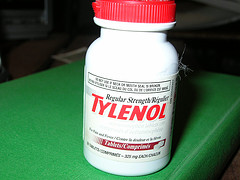
Tylenol is one of the best brand rebuilding stories that marketing students in just about every college learn about. It’s a great example of a company responding to negative publicity (in the case of Tylenol – the worst publicity you can imagine – 7 cyanide poisoning deaths in the 1980s from tampering with Tylenol packaging). I remember the incident well, and the team behind Tylenol did an amazing job of very quickly regaining consumer trust in the brand. What could have been the end of a brand that at the time still competed closely with aspirin, became a minor bump in the brand’s growth to become the number one over-the-counter pain reliever.
Today, Tylenol faces a new battle. This time, the fight is with the Food and Drug Administration (FDA) who wants to regulate sales of Tylenol by reducing the amount of acetaminophen (the active ingredient) in Tylenol claiming it causes liver damage and possibly making Extra Strength Tylenol available as a prescription only.
Certainly, sales of Tylenol will go down if the Extra Strength Tylenol product becomes OTC only. Or will they? Will consumers actually switch to a different product with a different active ingredient or wait to get a prescription for Extra Strength Tylenol, or will they just take a higher dosage of regular Tylenol? Is the FDA actually solving the problem? Or will this be just another small bump in the Tylenol brand story?
Either way, I’m sure the Tylenol team (under the power of Johnson & Johnson – a company that is very, very good at decentralizing and protecting one brand from another at all costs) is already fast at work at a new strategy, should one become necessary if the FDA successfully passes the new regulation it’s proposing. According to BrandWeek, full-page ads have already appeared in newspapers calling Tylenol the “safest brand of pain reliever you can choose.” However, it’s a different world now than it was in the 1980s. The social web is alive and spreading information, news, and rumors faster than ever. That’s something the Tylenol team didn’t have to think about in the 1980s.
We’ll have to wait and see how this one develops. What do you think? Will this become a big problem for Tylenol, or will the brand rebound with nary a scratch? Leave a comment and share your thoughts.
Image: Flickr
Susan Gunelius is the author of 10 marketing, social media, branding, copywriting, and technology books, and she is President & CEO of KeySplash Creative, Inc., a marketing communications company. She also owns Women on Business, an award-wining blog for business women. She is a featured columnist for Entrepreneur.com and Forbes.com, and her marketing-related articles have appeared on websites such as MSNBC.com, BusinessWeek.com, TodayShow.com, and more.
She has over 20 years of experience in the marketing field having spent the first decade of her career directing marketing programs for some of the largest companies in the world, including divisions of AT&T and HSBC. Today, her clients include large and small companies around the world and household brands like Citigroup, Cox Communications, Intuit, and more. Susan is frequently interviewed about marketing and branding by television, radio, print, and online media organizations, and she speaks about these topics at events around the world. You can connect with her on Twitter, Facebook, LinkedIn, or Google+.


